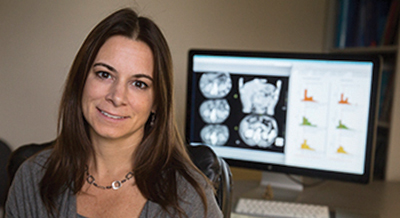
Body of knowledge
A summary of recent findings in clinical, translational and basic science research at UC Davis
The immune responses of a female mouse before pregnancy can predict how likely her offspring are to have behavioral deficits if the immune system is activated during pregnancy, UC Davis researchers reported in the journal Brain, Behavior, and Immunity. The findings could help resolve what role serious infections during pregnancy play in conditions such as autism and schizophrenia in offspring, they said.
UC Davis researchers have found a link between traffic-related air pollution and an increased risk for changes in brain development relevant to neurodevelopmental disorders. The Translational Psychiatry study, based on rodent models, corroborates previous epidemiological evidence showing this association.
Arteries respond in opposite ways for males and females, with a protein known to expand blood vessels having different functions in each sex, according to UC Davis research published in the Proceedings of the National Academy of Sciences. Conducted using arterial cells from mice, the study is the first to identify sex-based distinctions in how the protein — Kv2.1 — works. The ultimate goal is to help inform tailored hypertension treatment strategies for men and women.
Autism severity can change substantially during early childhood, with girls tending to show greater reduction and less rise in symptom severity than boys, MIND Institute researchers reported in the Journal of Autism and Developmental Disorders. Previous studies indicated inconsistent results in terms of childhood changes, with a general sense that severity at diagnosis would last a lifetime.
A new technique developed by UC Davis researchers offers a significant advance in using magnetic resonance imaging to pick out even very small tumors from normal tissue, thanks to a new dual-contrast nanoprobe and special imaging analysis software. The research, reported in Nature Nanotechnology, could help detect very small early-stage tumors if translated for clinical use.
Homocysteine levels in the blood are a biomarker that can predict the severity of damage to small vessels from sickle cell disease, UC Davis researchers reported in the British Journal of Haematology. The research is the first to link homocysteine — an amino acid found in the blood and a risk factor associated with heart disease and stroke — with complications of sickle cell disease. It also is the first to offer a noninvasive approach to assess vessel damage in patients as young as four years of age.

Lubarsky elected to California Medical Association board
Representing the University of California health systems’ 6,000 physicians and all California physicians

Miglioretti honored for translational breast screening work
Improving the effectiveness of breast cancer screening

There aren’t a lot of respiratory viruses that go both upper and lower, and this is one of them — Michael Schivo, M.D., M.A.S.
Read all notable quotes

